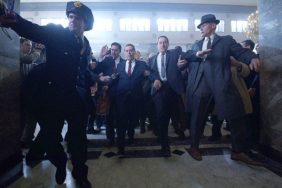The ending of Goodfellas (does it really need a Spoiler Alert?) finds mobster Henry Hill trapped in suburbia, where ketchup goes on spaghetti and a career criminal can only feel lost after a lifetime of high-rolling and flaunting society’s rules. It was seen as a bitter end to the antihero: if not its own brand of Hell, then at least an fitting form of Purgatory.
That’s where Luc Besson’s The Family kicks off. Robert De Niro plays an ex-mobster in the Witness Protection Program, Michelle Pfeiffer plays his wife, and Dianna Agron and John D’Leo play their kids. The Manzoni family loves each other and looks out for their own, but a lifetime of criminality leads them to solve everyday problems by meting out horrific violence on their unknowing abusers: shady plumbers, rude grocery store clerks, schoolyard bullies and overzealous suitors alike.
Like Herbert Ross’s My Blue Heaven before it, Besson (who co-wrote the screenplay) mines this “stranger in a strange land” schtick for everything its worth, creating a funny world of likable criminals whose defiance of legality and conventional social interaction makes them simultaneously heroes, martyrs and villains. They act on the wrathful impulses most people impotently twist through every day. We laugh because it’s just a movie, we cheer because they’re living out our slightly shameful fantasies, and they escape our scorn because The Family, at least, finds them lovable.

Exclusive Interview: Luc Besson describes how he got Martin Scorsese’s blessing to make The Family.
But Luc Besson admittedly tests the limits of our ability to empathize with the Manzoni family, now the Blakes, by treating the violence in The Family the same way he treats violence in every other movie: respectful of the harm that it causes the human body, no matter how much the victim “deserves” it. It’s almost enough, particularly when the film culminates in a vicious shout-out that threatens (and/or kills) every character in the cast, to make The Family less than palatable.
Fortunately, Besson’s sunburnt cinematography, too-tidy camera angles and fetish for teenaged girls in virginal white dresses packing heat is a constant reminder that, really, everything shocking in The Family is just an exclamation point on a very simple statement: moviegoers love the Mafia. And we do. We really do. The Family places familiar mob archetypes – the aging Don, the morally conflicted wife, the boy with a knack for criminality and the young girl who’s not as defenseless as she looks – against a backdrop of banal nonsense to show just how over the top our concept of these felons really is. We applaud, as the characters on screen do, for Goodfellas, but place its protagonists in our own neighborhood and maybe we won’t be so fond of the consequences their crimes bring down upon us.

Top This: 10 Underrated Gangster Movies, from Lansky to Donnie Brasco.
The Family takes advantage of Luc Besson’s rarely celebrated wit, with perpendicular storylines, well-timed comic buttons and amusingly constructed characters who approach every situation in a funny, relatively honest way. It’s also a reminder that, really, very few directors approach violence as effectively as Besson does, displaying the horrors of brutal human contact in a way that consistently entertains. The Family is equal parts mean and adorable, and if you can accept that those attitudes aren’t mutually exclusive, you’ll find it to be one of the better comedies of the year.

William Bibbiani is the editor of CraveOnline’s Film Channel and co-host of The B-Movies Podcast. Follow him on Twitter at @WilliamBibbiani.






